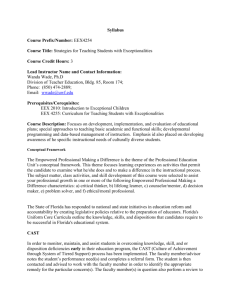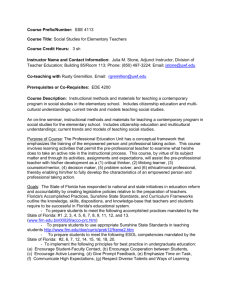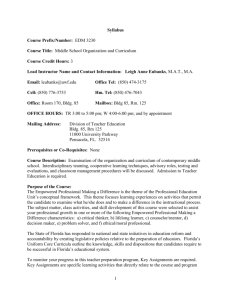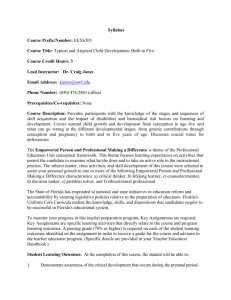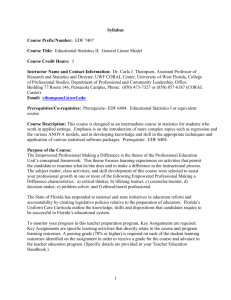Syllabi Format - University of West Florida
advertisement
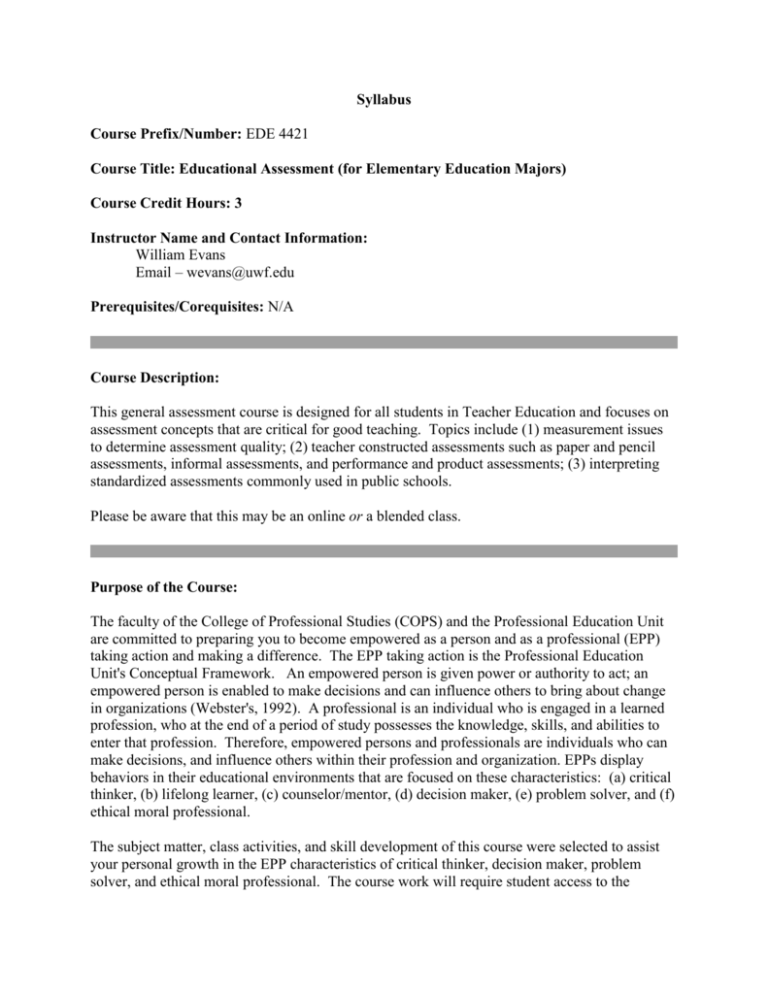
Syllabus Course Prefix/Number: EDE 4421 Course Title: Educational Assessment (for Elementary Education Majors) Course Credit Hours: 3 Instructor Name and Contact Information: William Evans Email – wevans@uwf.edu Prerequisites/Corequisites: N/A Course Description: This general assessment course is designed for all students in Teacher Education and focuses on assessment concepts that are critical for good teaching. Topics include (1) measurement issues to determine assessment quality; (2) teacher constructed assessments such as paper and pencil assessments, informal assessments, and performance and product assessments; (3) interpreting standardized assessments commonly used in public schools. Please be aware that this may be an online or a blended class. Purpose of the Course: The faculty of the College of Professional Studies (COPS) and the Professional Education Unit are committed to preparing you to become empowered as a person and as a professional (EPP) taking action and making a difference. The EPP taking action is the Professional Education Unit's Conceptual Framework. An empowered person is given power or authority to act; an empowered person is enabled to make decisions and can influence others to bring about change in organizations (Webster's, 1992). A professional is an individual who is engaged in a learned profession, who at the end of a period of study possesses the knowledge, skills, and abilities to enter that profession. Therefore, empowered persons and professionals are individuals who can make decisions, and influence others within their profession and organization. EPPs display behaviors in their educational environments that are focused on these characteristics: (a) critical thinker, (b) lifelong learner, (c) counselor/mentor, (d) decision maker, (e) problem solver, and (f) ethical moral professional. The subject matter, class activities, and skill development of this course were selected to assist your personal growth in the EPP characteristics of critical thinker, decision maker, problem solver, and ethical moral professional. The course work will require student access to the internet and proficient skills in educational technology. If you do not have access to the internet, the University provides both access and student computer laboratories. Student Learning Outcomes: Students will demonstrate proficiency in the following areas upon completion: 1. Knowledge and skills to develop and evaluate a comprehensive classroom assessment plan. 2. Knowledge and skills in constructing, implementing, and evaluating classroom assessment techniques. 3. Knowledge and skills of interpreting and using standardized tests. 4. Knowledge and skills of working with other professionals and with parents in an interdisciplinary effort to monitor and improve student achievement. Florida Educator Accomplished Practices (from Florida Department of Education – Preprofessional Educator Accomplished Practices @ http://www.fldoe.org/dpe/publications/preprofessional4-99.pdf) The preprofessional teacher collects and uses data gathered from a variety of sources. These sources include both traditional and alternate assessment strategies. Furthermore, the teacher can identify and match the students’ instructional plans with their cognitive, social, linguistic, cultural, emotional, and physical needs. Key Indicators for Assessment include: (A-4) Identifies students’ cognitive, social, linguistic, cultural, emotional, and physical needs in order to design individual and group instruction. (A-5) Employs traditional and alternative assessment strategies in determining students’ mastery of specified outcomes. (A-7) Modifies instruction based upon assessed student performance. (A-10) Interprets, with assistance, data from various informal and standardized assessment procedures. (A-11) Reviews assessment data and identifies students’ strengths and weaknesses. (A-12) Communicates individual student progress in student, parent, and staff conferences. (A-13) Develops short- and long-term personal and professional goals relating to assessment. Florida State Area Competencies & Skills for Elementary Education K-6 (from Florida Department of Education Assessment and School Performance @ http://fldoe.org.asp/ftce/pdf/60ElementaryEducationK-6.pdf) 60.6. Knowledge and use of reading assessment 60.6.1. Identify measurement concepts, characteristic, and uses of norm-referenced, criterion-referenced, and performance-based assessments. 60.6.3. Interpret assessment date (e.g., screening, progress monitoring, diagnostic) to guide instructional decisions. 60.6.5. Interpret a student’s formal and informal assessment results to inform students and parents. 60.6.6. Evaluate the appropriateness (e.g., curriculum alignment, cultural bias) of assessment instruments and practices Reading Competencies (From http://info.fldoe.org/docushare/dsweb/Get:Document1004/ReadingEndorsement_Competiences.pdf) Competency 3: Foundations of Assessment: Specific Indicators 3.3 Interpret students’ formal and informal test results. 3.4 Identify measurement concepts and characteristics and uses of norm-referenced and criterion-referenced tests. 3.5 Understand the meaning of test reliability and validity, and describe major types of derived scores from standardized tests 3.6 Demonstrate knowledge of the characteristics, administration, and interpretation of both quantitative and qualitative instructional assessments (to include each of the following: screening, diagnosis, progress monitoring, and outcome measures). Sunshine State Standards The Sunshine State Standards are currently under revision by the State Board of Education to review and adopt World Class Education Standards that prepare Florida’s students to effectively engage, communicate, and compete globally with students around the world. Florida’s standards will incorporate important skills such as critical thinking, problem-solving, creativity, innovation, collaboration and communication. They may be accessed at: http://www.fldoe.org/bii/curriculum/sss/ ESOL Competencies (From http://www.fldoe.org/profdev/pdf/final_esol.pdf) To prepare student to satisfactorily meet the diverse needs of students for whom English is a second language (ESOL) or have limited English proficiency (LEP) through the following competencies: Standard 4.5: Identify strategies for facilitating articulation with administrators, content area teachers, parents, and the community. Standard 14.5: Design appropriate tests for determining placement and assessing progress and achievement of LEP students. Standard 19.3: Identify suitable assessment instruments that assist in complying with legal obligations of districts serving LEP students. Standard 20.2: Design appropriate tests for determining placement and assessing progress and achievement of LEP students. Standard 20.3: Adapt content-area tests to ESOL levels appropriate to LEP students. Competency Alignment Matrix Project Name and Assessment Tool Drop Box 2 – Analysis of Personal Strengths and Weaknesses Final Project: Case Study Conceptual Framework Outcomes (Characteristics) Critical Thinker Ethical/Moral Professional Critical Thinker Decision Maker Ethical/Moral Professional Problem Solver Counselor-Mentor NCATE Standards FEAPs Subject Area Competencies and Skills 1 2 A-13 00.3.1, 00.3.2 1 2 A-4, A-5, A7, A-10, A-11, A-12 60.6.1, 60.6.3 60.6.5, 60.6.6 Topics Covered by Section: Section 1 – Foundation and Function of Assessment History of assessment Current assessment practices Legal requirements Purposes of assessment ESOL Reading Performance Endorsement Standards Competencies & Indicators 3.3, 3.4, 3.5, 3.6 4.5, 14.5, 19.3, 20.2, 20.3 4.5, 14.5, 19.3, 20.2, 20.3 3.3, 3.4, 3.5, 3.6 How not to make enemies Websites http://www.hooverdigest.org/024/ravitch.html (History) http://www.ed.gov/pubs/NatAtRisk/index.html (A nation at risk) http://www.newhorizons.org/strategies/assess/terminology.htm (Glossary) http://www.nixonpeabody.com/linked_media/publications/EAI_05002002.pdf (Legal) http://www.westegg.com/unmaintained/carnegie/win-friends.html (How to not make enemies) Section 2 – Principles of Assessment Sources and types of information Organizing information Cardinal rules of assessment Central tendency and dispersion Trustworthiness: What scores mean Assessing performance vs. learning Florida Comprehensive Achievement Test (FCAT) Section 2 Websites http://assess.nelson.com/a-gloss.html (Scores) http://alpha.fdu.edu/psychology/age_vs_grade_based_scores.htm (Age vs. grade based scores) http://www.ldonline.org/ld_indepth/assessment/tests_measurements.html (LD online) http://www.ncrel.org/sdrs/areas/issues/students/earlycld/ea5lk14.htm (Purpose of testing) http://davidmlane.com/hyperstat/normal_distribution.html (Normal distribution) http://www.tea.state.tx.us/student.assessment/taks/standards/sem.pdf (SEM) http://web.sau.edu/WaterStreetMaryA/NEW%20intro%20to%20tests%20&%20measures %20Website_files/standard_error_of_measurement.htm (SEM) http://www.dmu.ac.uk/~jamesa/teaching/assessment.htm (Reliability and Validity) http://www.nclrc.org/portfolio/6-0.html (Reliability and Validity) http://education.umn.edu/nceo/OnlinePubs/Synthesis40.html http://fcat.fldoe.org (FCAT) Section 3 - Assessing Behavior and the Teacher and Learning Environment to Improve Student Performance Teacher behavior and beliefs Classroom variables Our of classroom variables Section 3 Websites http://www.education-world.com/a_admin/admin/admin368.shtml (Behavior) http://education.curtin.edu.au/iier/iier7/dunkin.html (Teacher effectiveness) http://www.findarticles.com/p/articles/mi_m0FCG/is_1_29/ai_84667404 (Teacher behavior) http://www.leaonline.com/doi/abs/10.1207/s15327930pje7904_1 (Variables-In class and out) Section 4 - Assessing Student Performance Knowing what to assess Knowing how and where to assess Best practices Cautions How to use information from testing in instructional planning Section 4 Websites http://www.air.org/cecp/fba/problembehavior/strategies.htm (Alternative assessment) http://www.cotf.edu/ete/teacher/rubricassess.html (Helping your groups work together) http://pareonline.net/getvn.asp?v=7&n=4 (Portfolio) http://www.cshe.unimelb.edu.au/assessinglearning/03/group.html (Assessing a group) http://www.fldoe.org/bii/curriculum/sss/ (Sunshine State Standards) http://www.sph.emory.edu/WELLNESS/reading.html (Assessing Reading) http://www.nclrc.org/essentials/reading/assessread.htm (Assessing Reading) http://teacher.scholastic.com/newteacher/readers/assessment/ (Assessing Reading) http://www.nationalmathtrail.org/assessing_math_trail_projects.html (Assessing Math) http://educational-advisor.com/mathcautions.html (Math assessment cautions) http://www.isbe.net/spec-ed/PDF/BMChapter3-7-12.pdf language http://www.proteacher.net/cgi-bin/dcforum/dcboard.cgi?az=list&forum=writing (Language) http://www.k111.k12.il.us/lafayette/fourblocks/angie%27s_assessment_%281st_gr%29.h tm (Language) http://www.nwrel.org/scpd/sirs/4/snap15.html Assessing Writing) http://www.education-world.com/a_admin/admin/admin368.shtml (Behavior rubrics) http://www.fape.org/idea/what_idea_is/osher/indivinterv.htm (Assessing individual behavior) http://www.education-world.com/a_issues/issues110.shtml (Cautions re high stakes testing) http://cecp.air.org/fba/ (FBA) http://www.fape.org/idea/what_idea_is/osher/main.htm (FBA) Section 5 - Assessment Issues for Students with Special Needs Alternate assessment at the state level Requirements for alternate assessment How to determine eligibility for alternate assessment Section 6 - Interpreting and Communicating Assessment Information Knowing what is important Turning information into plans Communicating assessment results What not to do What to do when it all goes wrong Section 6 Websites http://faculty.washington.edu/krumme/guides/bloom.html (Writing objectives-Bloom’s Taxonomy) http://www.ext.colostate.edu/nso/nso/Educational%20Objectives/edobjectivespage.htm (Educational objectives) http://chiron.valdosta.edu/whuitt/col/plan/behobj.html (Writing objectives) http://www.mde.k12.ms.us/extrel/pub/guide2.htm (Communication) Tentative Schedule of Readings and Assignments: READING AND QUIZ SCHEDULE Section 1 2 3 4 Reading Completed By 1/16 2/6 3/12 4/9 Quiz 1/16-17 2/6-7 3/13-14 4/10-11 Study Guide Open Open Open Open THREADED DISCUSSIONS Discussion Topic Introduction Standardized Tests Dates 1/9 - 12 2/11 - 12 Points 5 10 DROPBOX ASSIGNMENTS Dropbox Introductory Assignment #1 Assignment #2 Assignment #3 Due Date 1/12 @ 11:59 PM 1/30 @ 11:59 PM 3/31 @ 11:59 PM 4/10 @ 11:59 PM Points 10 10 10 FINAL EXAM ASSIGNMENTS Assignment First Final Exam Assignment Second Final Exam Assignment Third Final Exam Assignment Fourth Final Exam Assignment Final Exam (includes Culminating Activities) Due Date 1/18 @ 11:59 PM 2/15 @ 11:59 PM 3/8 @ 11:59 PM 4/5 @ 11:59 PM 4/18 @ 11:59 PM Points 10 10 10 10 100 LIVEROOM CHATS There will be two Liveroom Chats. These chats are not required and there are no points associated with them, but they are available should you need additional assistance Chat on Quiz 2 and the Final Exam - 1/27 7:00-8:00pm Chat on the Final - 3/31 7:00-8:00pm . EXTRA CREDIT ASSIGNMENTS Several opportunities for extra credit will be provided throughout the semester. There are several credit assignments that are announced. The rest are unannounced. Therefore, you must frequently check the Extra Credit Folder on the course content page to determine if an extra credit assignment is available. You can only submit if you have completed all assignments since the previous extra credit assignment. Keep checking the "Extra Credit" folder on the course content page. These assignments cannot be made up once they are closed. There are also extra credit point opportunities embedded in the readings. Texts: Required: Popham, J. W. (2005). Classroom assessment. Boston” Allyn and Bacon. ISBN 9780205412563 Required: TK20 Subscription available directly at http://uwf.tk20.com or through the UWF campus bookstore - Student Access Kits (ISBN 0-9774408-1-8) See additional information provided in the next section. Websites: Pertinent websites are provided by section. The websites provide critical information that will be used in the lectures, tests and assignments. These websites are not meant to be exhaustive, but rather provide a beginning for your reading. The Professional Education Unit at UWF adopts TK20: UWF recently enhanced its procedures to ensure that you receive the quality education you deserve! The Professional Education Unit implemented a set of new and exciting software tools that enable you to fully grasp all six aspects of being an Empowered Person and Professional who takes action and makes a difference. The set of tools that is required as a course text is called TK20 CampusTools. This comprehensive system provides us with a rich set of tools to help maintain the quality of our programs and your education. Here is a partial listing of what the tools will allow you to do. The Tk20 system will allow you to: 1. Build your artifacts/assignments electronically, online. Your artifacts will stay with you, so you can use them for years, even after graduation. 2. Create electronic portfolios for documenting your work for presentation to the faculty and prospective employers. 3. Have a fully documented record of your field experience work and your experience with student teaching/clinical practice. 4. Fill out all your application forms online. This includes applications for admission to the program and for student teaching. 5. Future enhancements will allow you to receive updates on job openings and employment possibilities. The UWF TK20 Unit Administrator is Dr. Richard Faessel. If you need assistance, you may contact Dr. Faessel directly at Tk20@uwf.edu or by phone: (850)857-6311. We appreciate your hard work and dedication toward completing your education at the University of West Florida! Grading/Evaluation System: Grading Criteria: Assignment 2 Threaded Discussions 3 Drop Box Assignments 4 Quizzes 4 Final Exam Assignments Final Exam Total Points 15 30 85 40 100 270 Several extra credit opportunities will be available. You are encouraged to take advantage of the information (and extra points) they will provide. Course Grade Determination: A B C D F 90% - 100% 80% - 89% 70% - 79% 60% - 69% 59% and below At the instructor's discretion, assignments can be cancelled. In this event, the points earned will not be used in computing the student's grade and the stated grading scale will be used. References/Bibliography: American Psychological Association. (1994). Publication manual of the American Psychological Association (4th ed.). Washington, D.C.: American Psychological Association. Borich, G. D. (1999). Observation skills for effective teaching. Upper Saddle River, NJ: Merrill/Prentice Hall. Linn, R. L., & Gronlund, N. E. (1995). Measurement and assessment in teaching (7th ed). Upper Saddle River, NJ: Merrill/Prentice Hall. Overton, T. (1996). Assessment in special education: An applied approach. Upper Saddle River, NJ: Merrill/Prentice Hall. Sattler, J. M. (1990). Assessment of children (3rd ed.). San Diego, CA: Jerome M. Sattler, Publisher. Worthen, B. R., White, K. R., Fan, X., & Sudweeks, R. R. (1999). Measurement and assessment in schools. (2nd. ed.). New York: Longman. Special Technology Utilized by Students: Each UWF Student is expected to: • activate a UWF ArgoNet email account • access email two to three times weekly • have basic word processing knowledge Course Technology This course may be taught in either a blended format or online format. 100% of the course work requires use of software available from an ArgoNetenabled computer or equivalent. This course does not require any on-campus meetings. Instructor will be present in the classroom at this location. (Blended sections) Tk20 software is a requirement of this course. Expectations for Academic Conduct/Plagiarism Policy: As members of the University of West Florida, we commit ourselves to honesty. As we strive for excellence in performance, integrity-personal and institutional-is our most precious asset. Honesty in our academic work is vital, and we will not knowingly act in ways which erode that integrity. Accordingly, we pledge not to cheat, nor to tolerate cheating, nor to plagiarize the work of others. We pledge to share community resources in ways that are responsible and that comply with established policies of fairness. Cooperation and competition are means to high achievement and are encouraged. Indeed, cooperation is expected unless our directive is to individual performance. We will compete constructively and professionally for the purpose of stimulating high performance standards. Finally, we accept adherence to this set of expectations for academic conduct as a condition of membership in the UWF academic community. Student Handbook: (PDF Format) http://www.thezonelive.com/zone/02_SchoolStructure/FL_UniversityofWestFlorida/handbook.p df Assistance: Students with special needs who require specific examination-related or other course-related accommodations should contact the Student Disability Resource Center (SDRC), sdrc@uwf.edu, 850.474.2387. SDRC will send an email to the instructor that specifies any recommended accommodations. SDRC will provide the student with a letter for the instructor that will specify any recommended accommodations.
